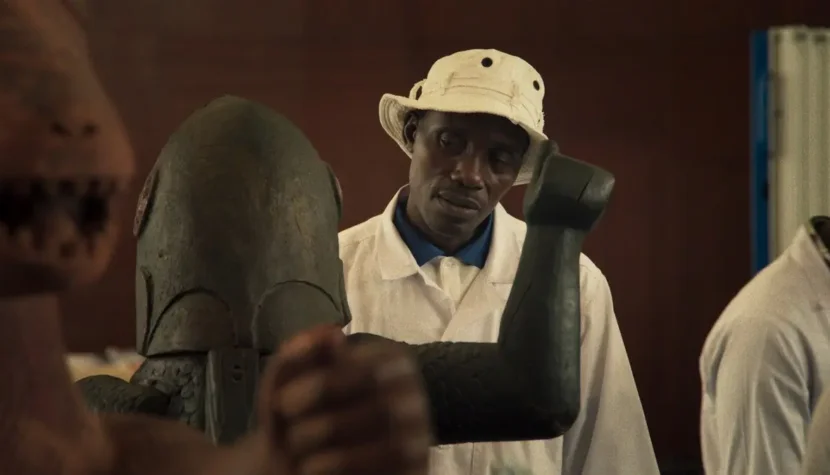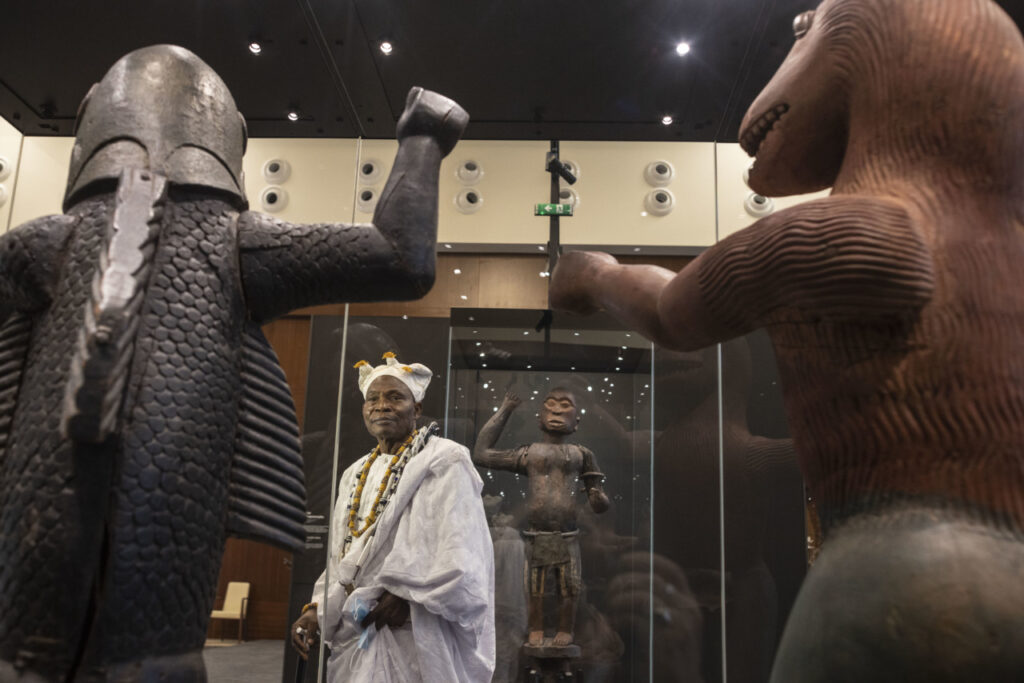DAHOMEY. A Difficult History

Dahomey is the historical name of an African state that existed for about 300 years until the early 20th century in the territory of today’s Republic of Benin. In the late 19th century, the wars with France brought an end to Dahomey’s statehood, leading to decades of colonial dependency, the shadow of which still hangs over contemporary Dahomey-Benin. Over a hundred years after the French pacification of the Kingdom, 26 local artworks, once looted by the French, have returned to Africa. This return of Dahomean artifacts to their homeland is the subject of Mati Diop’s new film (Atlantics), simply titled Dahomey.
Diop’s hour-long documentary follows the journey of these 26 artifacts, from packing at Paris’ Quai Branly, to their landing on African soil, cataloging by local historians and archaeologists, and finally to their re-exhibition in a Beninese museum institution. The director presents the French return of the artifacts step by step, surrounding the factual frames with contextual commentary to introduce the viewer – who likely has only a vague understanding of the Kingdom of Dahomey and the significance of the displayed artworks – to a history that includes the gesture of former colonizers. The protagonists are the artifacts themselves, with a representative – a statue of King Gezo – breaking conventional documentary form by speaking on screen, narrating its exile and return in the first person. After all, the creator of Dahomey is not a TV crew from Porto-Novo, but a respected director from a renowned Senegalese filmmaking dynasty.

Unfortunately, the promise of an intriguing story about the return of artifacts to a renamed homeland goes unfulfilled. Diop incorporates several artistic ideas into her film – the aforementioned artifact narration, impressionistic street shots, an ethnographic focus on the descendants of the titular Kingdom in an extended student debate sequence. However, none of these concepts are fully developed or drawn out as the aesthetic key to Dahomey, which remains painfully formulaic, practically shot in the flat convention of a television report. In fact, the only scenes that stand on their own are the street noise shots at the film’s end, as King Gezo’s monologue is irritatingly devoid of visual arrangement, and the debate is edited in such a way that it yields few constructive conclusions or interpretative suggestions.
It all seems as if Mati Diop received a government commission to make a documentary about the return of 26 artifacts to Benin, so she quickly shot a report on their transport and reception, adding a few “authorial” signatures to claim it as an ambitious project. The result is disheartening, not only due to the lack of inventiveness or rather the willingness of the undoubtedly talented author, but also because of the political tone of the film (awarded for its social angle with the Golden Bear in Berlin), which, apart from a side remark about the hundreds of Dahomean treasures still in French collections, does not engage in a critical dialogue with the post-colonial reality. More than a reflection on intertwining past and present, Dahomey offers a historiosophical reading, clearly aimed more at a white audience, and politically neutral, safe from both the Beninese and French perspectives.

Dahomey undoubtedly has educational value, and Diop’s film can be appreciated for that, but unfortunately, that’s the only merit of the documentary. One can only hope that the fee for the film story about the 26 treasures returning home and the symbolic capital boost from the festival circuit (albeit somewhat exaggerated) will allow the director to calmly and energetically prepare a worthy successor to Atlantics. For Dahomey is likely to remain a curiosity, a side project in her filmography, rather than her calling card. At least, that’s the hope, because otherwise – if this award-winning documentary, and not an underappreciated feature film, sets the trajectory of her career – Diop might become another casualty in the struggles between Dahomean and French forces.

